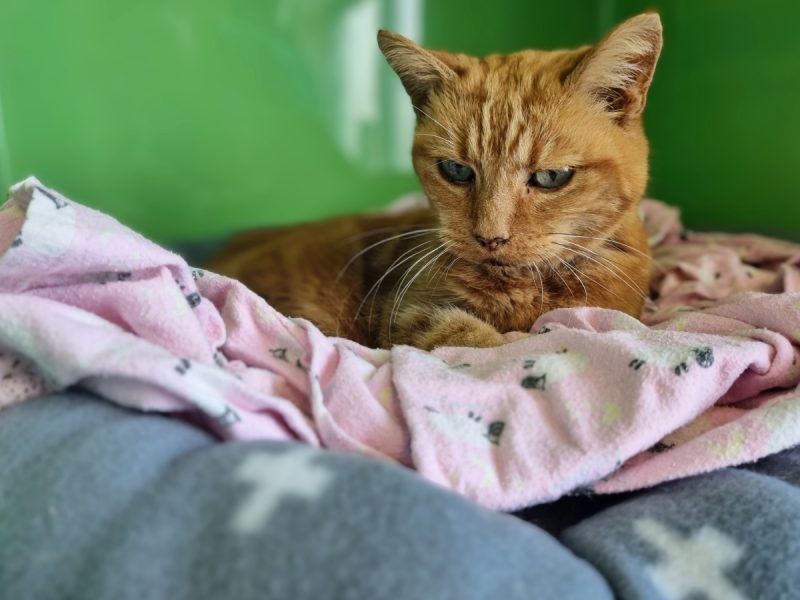
The one feature of feline behavior that everyone knows is that cats purr when they are happy and content. But during my career, I came to realize that some of my sickest feline patients would purr, sometimes energetically, almost aggressively! I knew these cats were in a bad way, and that despite the treatment and pain relief we were providing, they were almost certainly still suffering to a certain degree.
This led me to believe that these cats were purring as a method of self-soothing, and after a bit of research, I found that I wasn’t the only one to have reached this conclusion.
The Benefit of Hindsight
When my elderly cat, Sully, who had traveled all the way from Australia to the UK, passed away at home when we weren’t there, I was devastated. Although I was obviously very sad that she had died, I was particularly upset that we hadn’t seen it coming, and that she had been alone. She had seemed bright and well, her normal self, even on the morning of her passing, and I believe that her 16-year-old heart had just had enough, and she’d given no indication that anything was amiss. Or had she?
Knowing what I know now, I look back on her last few weeks and remember that she had been a little more affectionate, and a lot more purry. At the time, I interpreted this to mean that, after 18 months, she was finally starting to feel more settled in her new, colder home. Now I wonder if she was trying to make herself feel better, and unfortunately, I will never know the truth.
Purring and Endorphins
Research has suggested that the vibrations produced when a cat purrs may release endorphins, a chemical produced by the body that provides pain relief, and in doing so, improves mood and contentment levels.
Don’t freak out and worry that every time your cat is purring it means they are in pain! This isn’t at all what I – or anyone else – is suggesting. The purring of a happy cat is just that, a natural response that enhances and sustains those feelings, as well as communicating them to others. Purring isn’t a clinical sign of pain or illness, but it can sometimes be a clue that pain or illness are present and severe.
This is not something I have seen in acutely injured cats, but I have seen it in cats recovering from surgery or those with a chronic or serious disease.
The Terminal Purr
After experiencing the purring of extremely unwell, even dying, cats, I came up with a term to describe the phenomenon: the terminal purr. In many – but not all – cases, it became almost like a death knell, telling me that the end was near. What made it more difficult was that this end-stage purring would often give the cat’s family a glimmer of hope and optimism, as they understandably believed that the purring was a sign of recovery. Realizing that their cat’s purring was more of a ‘bad sign’ was always a crushing blow.
For cats who were suffering from a terminal illness, whose treatment options we had completely exhausted, I would often use the ‘terminal purr’ as an indication that it was time to consider euthanasia. As difficult as it may be to put a beloved cat to sleep when they are still purring, I would explain that the alternative was to wait until they no longer could, and that would mean that their endorphin supply had run out, too.
It is much like the tail wag of a dog that has reached the end of their life or treatment options; I always feel that it is better to say goodbye when they still have a little tail wag left than to leave it until they no longer can.
Don’t Fear the Purring
Again, please don’t start panicking whenever your cat starts up their rumbling engine – it does not mean they are dying! The ‘terminal purr’ is something I only associate with a cat that is actively experiencing illness or end of life. That being said, if your cat has started purring more often and/or at unusual times, or is acting out of character, a check-up with your vet is absolutely a good idea.
Would Sully have been with us a little longer if I had made the connection between her increased purring and a possible heart problem? Look, it’s possible. Do I blame myself for not realizing there was a problem? I don’t. I was devastated that I was not by her side when she passed away, but I also know that just a few hours before, she had been purring and eating, and enjoying a fuss, which was a pretty good goodbye, even if I didn’t know at the time that it was a goodbye.
What I do suggest you take from my experience is that if you have a cat that is very elderly or has a chronic illness, don’t dismiss a lot of purring as a sign that everything is okay. It could mean they need an adjustment of their medication, it could be that their time is coming, or it could just mean that they’re feeling particularly happy and content! But it’s up to us to look at the whole picture and listen to what our cats are trying to tell us.
Have you ever experienced the ‘terminal purr’? Share your story in the comments below.
- Read her previous article: How to Do A Health Check At Home: Dr. Karyn’s Detailed Guide